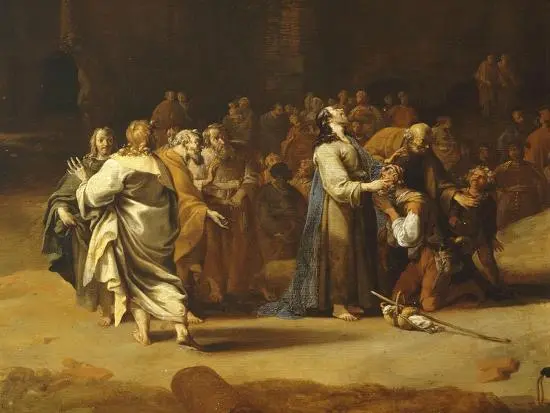Jijo Kandamkulathy, CMF
Claretian Publications, Macau
Mk 7:31-37
23rd Sunday in Ordinary Time – Year B
Gospel Reflection
The gospel passage today deals with the healing of the deaf and dumb man in the Decapolis, the region of the Gentiles.
The narration invites us to pay attention to an Aramaic word, “ephatha,” which means be opened, and to the symbolism of the deaf-mute. Understanding this focus requires us to locate where this miracle takes place. Jesus had visited the Decapolis a little earlier. Remember the Gadarene man who lived among the tombs? It is the place where the people had asked Jesus to get out. They were afraid of having to stop their unholy trades, represented by the rearing of swine. So Jesus is visiting another town near the Gadarenes in the Decapolis, a place of the pagans. This time around, the story is of a man tied up in speech and hearing. It looks more like Jesus was casting out evil than healing, and the gesture of making spittle and applying in the eyes are probably practices connected with casting out evil that prevents a man from listening and proclaiming the word of God.
In the narrative of the casting out of the legions from the Gadarene man, it is clear that he was more a symbol of the whole pagan cult there. Even this deaf and mute person could be a type. The “ephatha” pronouncement could be a personal story of the deliverance of the man. But it also sounds very symbolic of opening up the pagan world to listen to the word of God and the right to preach it. Given the educative value of the gospel stories to the community of the evangelist, it is all the more reason to believe that this is an answer to the dilemma on the authority of the gentile converts to preach. With “ephatha,” they are commissioned to listen and preach the Word.
The deaf and mute man is unable to communicate. Sadly, the man’s situation mirrors our predicament in the most communicative of places we can imagine—the social media. What comes to a glaring focus in social media is the inability of people to communicate and discuss. The users form parallel monologuing groups instead of engaging in constructive dialogues or discussions. Social media has only brought together like-minded people and has added very little to developing sensible conversations with people who differ. The users are often deaf to alternative ways of thinking and dumb to differing opinions. There is a lack of engagement in serious listening.
After the miracle is performed, Jesus orders them not to publicize it. The orders to keep quiet play a joke on our world that stages roadshows to overprice underachieving leaders. There are no actions to speak louder than words, so they tend to double the noise. The need to advertise with loudspeakers, uniforms, banners, and symbols is a good commentary on underachievement. Jesus, on the contrary, refuses to make any roadshow of the miracle. Instead, he asks to keep it a secret. It is, probably, because he wanted to establish that the mission of the Messiah is not linked to the miracles but to the liberation of the bound.
Limiting our understanding of the hearing and speech impediment to a physical condition is to limit the potential of the word of God. Dumbness is the bondage of someone unable to find one’s voice, while deafness could be others withholding liberating messages from them. It has social and political significance. Who are the people who have lost voice in our society?
A special mention is made about Jesus taking the man aside. In the middle of the crowd, Jesus finds time and space for this afflicted person. He has made a habit of giving time and space to people for a personal encounter with him. The Lord is probably aware of the nature of the crowd. We had seen the crowd vanishing when Jesus taught them on the bread of life. We have seen the crowd creating blocks for people who want to make a closer encounter with Jesus. Think of the blind man crying out for help from Jesus and the crowd rebuking him. Zacchaeus could not meet Jesus because of the crowd. He had to climb on a tree to have a view of Jesus. The woman with a hemorrhage could not expect to have a personal encounter with Jesus in the middle of the crowd; she wished only to touch the fringe of his cloak. The children were prevented from encountering Jesus by the crowd (disciples)! The crowd is often after bread and fish. They will vanish when the test of faith comes, or simply place obstacles to encountering the Lord. Whereas an individual encounter with the Lord will leave an indelible mark with the person. Think of the blind man in the gospel of John. After his encounter with the Master, he refused to testify against Jesus and even invited the Pharisees to join him in faith. Witnessing comes after a personal encounter.
There could be a crowd faith or a sheepish faith in us. It only takes the lead sheep to take one direction, right or wrong, for the rest of the sheepfold to follow. There is also an option for a personal faith where decisions are taken based on the commitment to Christ and his values. Such encounters lead us to the freedom of the children of God. These encounters can take place through the Eucharist, the Word of God, and the poor. Freedom of the children of God springs from a liberating encounter with Christ, the Word of God.


 Follow
Follow


